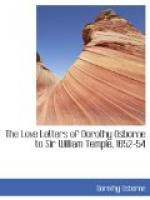“After residing at Cambridge two years, he departed without taking a degree, and set out upon his travels. He seems to have been then a lively, agreeable young man of fashion, not by any means deeply read, but versed in all the superficial accomplishments of a gentleman, and acceptable in all polite societies. In politics he professed himself a Royalist. His opinions on religious subjects seem to have been such as might be expected from a young man of quick parts, who had received a rambling education, who had not thought deeply, who had been disgusted by the morose austerity of the Puritans, and who, surrounded from childhood by the hubbub of conflicting sects, might easily learn to feel an impartial contempt for them all.
“On his road to France he fell in with the son and daughter of Sir Peter Osborne. Sir Peter held Guernsey for the King, and the young people were, like their father, warm for the Royal cause. At an inn where they stopped in the Isle of Wight, the brother amused himself with inscribing on the windows his opinion of the ruling powers. For this instance of malignancy the whole party were arrested, and brought before the Governor. The sister, trusting to the tenderness which, even in those troubled times, scarcely any gentleman of any party ever failed to show where a woman was concerned, took the crime on herself, and was immediately set at liberty with her fellow-travellers.
“This incident, as was natural, made a deep impression on Temple. He was only twenty. Dorothy Osborne was twenty-one. She is said to have been handsome; and there remains abundant proof that she possessed an ample share of the dexterity, the vivacity, and the tenderness of her sex. Temple soon became, in the phrase of that time, her servant, and she returned his regard. But difficulties, as great as ever expanded a novel to the fifth volume, opposed their wishes. When the courtship commenced, the father of the hero was sitting in the Long Parliament; the father of the heroine was commanding in Guernsey for King Charles. Even when the war ended, and Sir Peter Osborne returned to his seat at Chicksands, the prospects of the lovers were scarcely less gloomy. Sir John Temple had a more advantageous alliance in view for his son. Dorothy Osborne was in the meantime besieged by as many suitors as were drawn to Belmont by the fame of Portia. The most distinguished on the list was Henry Cromwell. Destitute of the capacity, the energy, the magnanimity of his illustrious father, destitute also of the meek and placid virtues of his elder brother, this young man was perhaps a more formidable rival in love than either of them would have been. Mrs. Hutchinson, speaking the sentiments of the grave and aged, describes him as an ‘insolent foole,’ and a ‘debauched ungodly cavalier.’ These expressions probably mean that he was one who, among young and dissipated people, would pass for a fine gentleman. Dorothy was fond of dogs, of larger and more formidable breed




